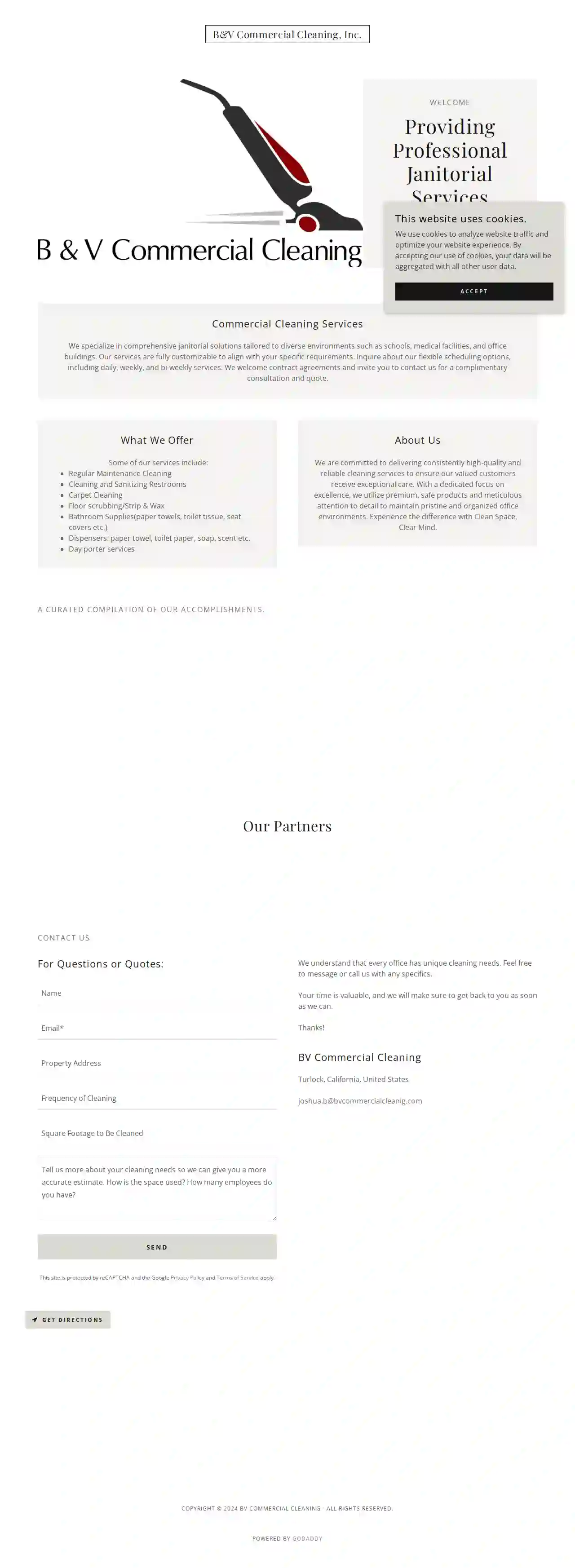Cleaning Services Heber
Find Cleaning Companies in Heber
Receive 3 FREE Professional Cleaners quotes for your project today! Compare profiles, reviews, accreditations, portfolio, etc... and choose the best service.

Hill Top Cleaning Services
510 reviewsLancaster, PA, 17601, USWelcome to Hill Top Cleaning Services Hill Top Cleaning Services is a leading provider of professional janitorial services in Lancaster, PA. We have been serving the community for many years and have a team of experienced cleaners who are dedicated to providing high-quality, reliable service. We understand that a clean and healthy environment is essential for both businesses and homes, and we are committed to providing our clients with the best possible cleaning experience. We offer a wide range of cleaning services to meet the needs of our clients, including office cleaning, carpet cleaning, upholstery cleaning, window washing, and more. We use only the highest quality cleaning products and equipment to ensure that your property is cleaned to the highest standards. We are also fully insured and bonded for your peace of mind. We are committed to providing our clients with exceptional customer service. We are always available to answer your questions and address your concerns. We are also happy to work with you to create a customized cleaning plan that meets your specific needs. If you are looking for a reliable and professional janitorial service in Lancaster, PA, then look no further than Hill Top Cleaning Services. Contact us today for a free estimate.
- Services
- Why Us?
- Gallery
Get Quote
B & V Commercial Cleaning, Inc.
59 reviewsTurlock, USAt B&V Commercial Cleaning, Inc., we specialize in providing professional janitorial services tailored to diverse environments such as schools, medical facilities, and office buildings. Our services are fully customizable to align with your specific requirements. With a dedicated focus on excellence, we utilize premium, safe products and meticulous attention to detail to maintain pristine and organized office environments. Experience the difference with Clean Space, Clear Mind.
- Services
- Why Us?
- Gallery
Get Quote
Unique Maintenance, Inc.
56 reviewsSanta Barbara, US- Services
- Why Us?
Get Quote
Deluxe Pro Cleaning LLC
550 reviewsSunnyvale, US- Services
- Why Us?
Get Quote
Marlon Cleaning services LLC
56 reviewsLancaster, US- Services
- Why Us?
Get Quote
Quality Maids Inc
51 reviewsSanta Barbara, US- Services
- Why Us?
Get Quote
Santana’s Cleaning Service
514 reviewsSan Jose, US- Services
- Why Us?
Get Quote
Monroy SF Cleaning Services
517 reviewsSan Francisco, US- Services
- Why Us?
Get Quote
Mission Cleaning
516 reviewsSunnyvale, US- Services
- Why Us?
Get Quote
Flores Janitorial Services LLC
54 reviewsSan Francisco, US- Services
- Why Us?
Get Quote
Over 60,241+ Janitorial Services on our directory
Our cleaning contractors operate in Heber and surroundings!
CleaningMatch has curated and vetted Top Janitorial Services in and around Heber. Find the most trustworthy business today.
Frequently Asked Questions About Cleaning Services
- Declutter first: Before cleaning, declutter surfaces and remove any items that don't belong. This makes cleaning easier and prevents distractions.
- Gather your supplies: Assemble all your cleaning supplies, including cleaners, cloths, sponges, and a trash bag, in a caddy or bucket to avoid wasting time searching for them.
- Work from top to bottom: Start cleaning from the top of each room and work your way down to prevent dust and debris from falling on already cleaned surfaces.
- Focus on high-traffic areas: Pay extra attention to high-traffic areas like kitchens and bathrooms, where dirt and germs accumulate quickly.
- Use the right tools: Utilize appropriate cleaning tools for different surfaces and tasks. Microfiber cloths are effective for dusting and cleaning glass, while scrub brushes are ideal for tough stains.
- Clean in sections: Break down larger tasks into smaller sections to avoid feeling overwhelmed. Focus on one area at a time before moving on to the next.
- Establish a routine: Create a regular cleaning schedule and stick to it. This prevents dirt buildup and makes cleaning more manageable.
- Check Fabric Care Label: Always check the upholstery care label for cleaning instructions specific to the fabric. Some fabrics may require professional cleaning.
- Vacuum: Vacuum the upholstery thoroughly to remove dust and loose debris. Use a brush attachment for crevices and seams.
- Spot Cleaning: For stains, blot with a clean cloth or sponge. Avoid rubbing, as it can spread the stain. Use a mild upholstery cleaner or a homemade solution of water and mild dish soap.
- Upholstery Cleaning Machine: If the fabric is suitable for wet cleaning, you can use an upholstery cleaning machine. Follow the machine's instructions carefully and test a small, hidden area first.
- Professional Upholstery Cleaning: For delicate fabrics, deep cleaning, or stubborn stains, consider hiring a professional upholstery cleaning service. They have specialized knowledge and equipment to clean upholstery safely and effectively.
- Experience: 'How long have you been in business, and what type of cleaning services do you specialize in?'
- Licensing and Insurance: 'Are you licensed, insured, and bonded? Can I see proof of coverage?'
- Background Checks: 'Do you conduct background checks on your employees?'
- Cleaning Supplies: 'Do you provide your own cleaning supplies and equipment, or should I provide them?'
- Cleaning Methods: 'What cleaning methods and products do you use?'
- References: 'Can you provide references from previous clients?'
- Scheduling and Availability: 'What days and times are you available for cleaning?'
- Pricing and Payment: 'What is your pricing structure, and what payment methods do you accept?'
- Cancellation Policy: 'What is your cancellation policy?'
- Satisfaction Guarantee: 'Do you offer a satisfaction guarantee? What happens if I'm not happy with the service?'
- Declutter Regularly: Set aside time regularly to declutter your belongings. Donate, sell, or discard items you no longer use or need.
- Designated Storage: Assign specific storage spaces for different items, such as shelves for books, drawers for clothes, and containers for toys.
- Labeling: Label storage containers and drawers to make it easy to find items and put them back in their designated places.
- 'One In, One Out' Rule: For every new item you bring into your home, get rid of an old one. This prevents clutter from accumulating.
- Vertical Storage: Utilize vertical storage solutions, such as shelves, wall organizers, and hanging racks, to maximize space.
- Digital Organization: Organize digital files and emails to reduce paper clutter. Use cloud storage services to free up space on your computer.
What are some tips for cleaning my own home efficiently?
By implementing these strategies, you can clean your home more efficiently and maintain a cleaner and healthier living space.
How do I clean upholstery without damaging the fabric?
Always test any cleaning solution on a small, inconspicuous area first to avoid discoloration or damage.
What should I ask a cleaning service before hiring them?
By asking these questions, you can assess their professionalism, reliability, and suitability for your cleaning needs.
What are some tips for keeping my home organized and clutter-free?
By adopting these strategies, you can create a more organized and clutter-free home, promoting a sense of calm and efficiency.
What are some tips for cleaning my own home efficiently?
- Declutter first: Before cleaning, declutter surfaces and remove any items that don't belong. This makes cleaning easier and prevents distractions.
- Gather your supplies: Assemble all your cleaning supplies, including cleaners, cloths, sponges, and a trash bag, in a caddy or bucket to avoid wasting time searching for them.
- Work from top to bottom: Start cleaning from the top of each room and work your way down to prevent dust and debris from falling on already cleaned surfaces.
- Focus on high-traffic areas: Pay extra attention to high-traffic areas like kitchens and bathrooms, where dirt and germs accumulate quickly.
- Use the right tools: Utilize appropriate cleaning tools for different surfaces and tasks. Microfiber cloths are effective for dusting and cleaning glass, while scrub brushes are ideal for tough stains.
- Clean in sections: Break down larger tasks into smaller sections to avoid feeling overwhelmed. Focus on one area at a time before moving on to the next.
- Establish a routine: Create a regular cleaning schedule and stick to it. This prevents dirt buildup and makes cleaning more manageable.
By implementing these strategies, you can clean your home more efficiently and maintain a cleaner and healthier living space.
How do I clean upholstery without damaging the fabric?
- Check Fabric Care Label: Always check the upholstery care label for cleaning instructions specific to the fabric. Some fabrics may require professional cleaning.
- Vacuum: Vacuum the upholstery thoroughly to remove dust and loose debris. Use a brush attachment for crevices and seams.
- Spot Cleaning: For stains, blot with a clean cloth or sponge. Avoid rubbing, as it can spread the stain. Use a mild upholstery cleaner or a homemade solution of water and mild dish soap.
- Upholstery Cleaning Machine: If the fabric is suitable for wet cleaning, you can use an upholstery cleaning machine. Follow the machine's instructions carefully and test a small, hidden area first.
- Professional Upholstery Cleaning: For delicate fabrics, deep cleaning, or stubborn stains, consider hiring a professional upholstery cleaning service. They have specialized knowledge and equipment to clean upholstery safely and effectively.
Always test any cleaning solution on a small, inconspicuous area first to avoid discoloration or damage.
What should I ask a cleaning service before hiring them?
- Experience: 'How long have you been in business, and what type of cleaning services do you specialize in?'
- Licensing and Insurance: 'Are you licensed, insured, and bonded? Can I see proof of coverage?'
- Background Checks: 'Do you conduct background checks on your employees?'
- Cleaning Supplies: 'Do you provide your own cleaning supplies and equipment, or should I provide them?'
- Cleaning Methods: 'What cleaning methods and products do you use?'
- References: 'Can you provide references from previous clients?'
- Scheduling and Availability: 'What days and times are you available for cleaning?'
- Pricing and Payment: 'What is your pricing structure, and what payment methods do you accept?'
- Cancellation Policy: 'What is your cancellation policy?'
- Satisfaction Guarantee: 'Do you offer a satisfaction guarantee? What happens if I'm not happy with the service?'
By asking these questions, you can assess their professionalism, reliability, and suitability for your cleaning needs.
What are some tips for keeping my home organized and clutter-free?
- Declutter Regularly: Set aside time regularly to declutter your belongings. Donate, sell, or discard items you no longer use or need.
- Designated Storage: Assign specific storage spaces for different items, such as shelves for books, drawers for clothes, and containers for toys.
- Labeling: Label storage containers and drawers to make it easy to find items and put them back in their designated places.
- 'One In, One Out' Rule: For every new item you bring into your home, get rid of an old one. This prevents clutter from accumulating.
- Vertical Storage: Utilize vertical storage solutions, such as shelves, wall organizers, and hanging racks, to maximize space.
- Digital Organization: Organize digital files and emails to reduce paper clutter. Use cloud storage services to free up space on your computer.
By adopting these strategies, you can create a more organized and clutter-free home, promoting a sense of calm and efficiency.